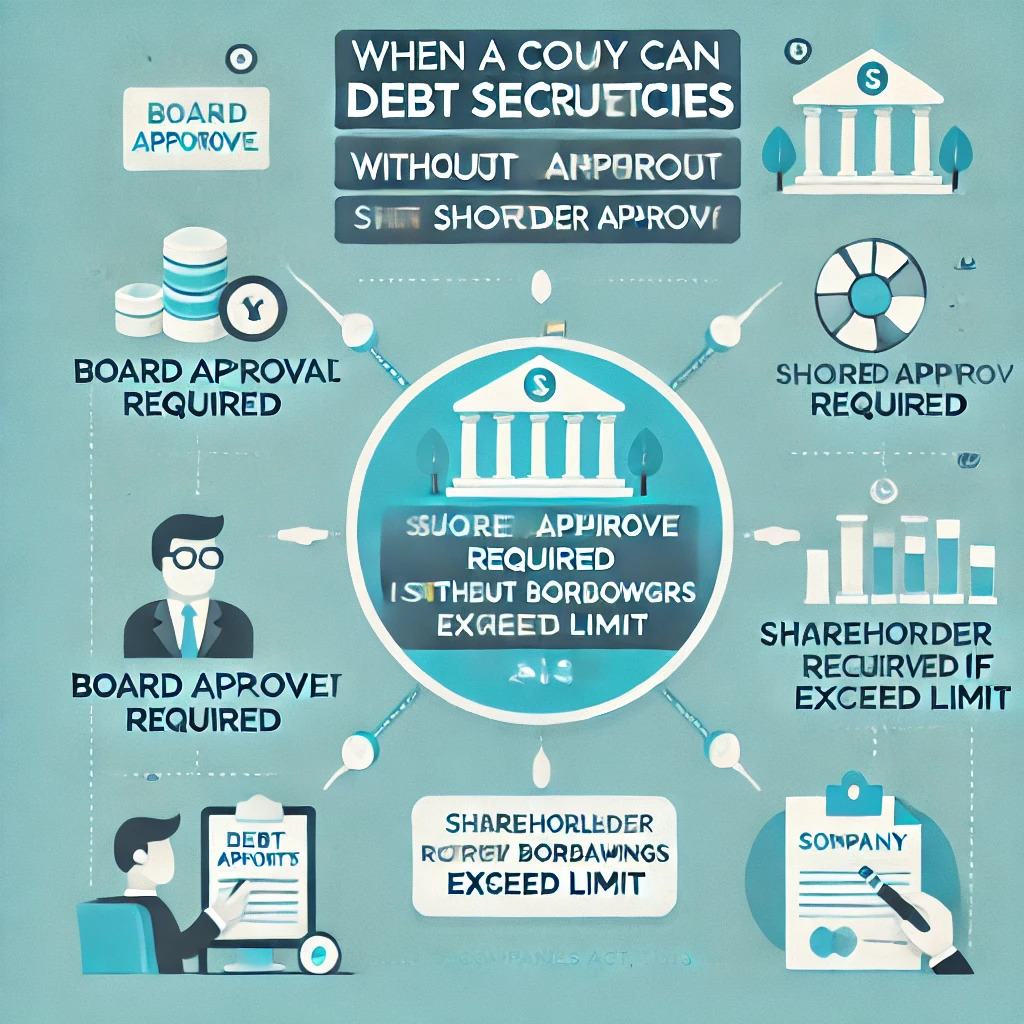View News
Can-Company-Issue-Debt-Securities-without-Shareholders-Approval

Can Company Issue Debt Securities without Shareholders' Approval?
The issuance of debt securities is a crucial method for companies to raise funds. According to Section 42 read with Rule 14 -Private Placement of the Companies Act, 2013.
A company shall not make an offer or invitation to subscribe to securities through private placement unless the proposal has been previously approved by the shareholders of the company, by a special resolution for each of the offers or invitations:
Provided that in the explanatory statement annexed to the notice for shareholders' approval, the following disclosure shall be made:-
(a) particulars of the offer including date of passing of Board resolution;
(b) kinds of securities offered and the price at which security is being offered:
(c) basis or justification for the price (including premium, if any) at which the offer or invitation is being made;
(d) name and address of valuer who performed valuation;
(e) amount which the company intends to raise by way of such securities;
(f) material terms of raising such securities, proposed time schedule, purposes or objects of offer, contribution being made by the promoters or directors either as part of the offer or separately in furtherance of objects; principle terms of assets charged as securities:
The definition of Securities is as follows:-
Section 2(5) of SECURITIES CONTRACTS (REGULATION) ACT, 1956
(h) “securities” include— (i) shares, scrips, stocks, bonds, debentures, debenture stock or other marketable securities of a like nature in or of any incorporated company or other body corporate;
So Debentures being Securities require shareholders approval?
There is one exemption.
As per the proviso under Rule 14(1) of the Private Placement Rules:
"Provided further that this sub-rule shall not apply in case of offer or invitation for non-convertible debentures, where the proposed amount to be raised through such offer or invitation does not exceed the limit as specified in clause (c) of sub-section (1) of section 180 and in such cases relevant Board resolution under clause (c) of sub-section (3) of section 179 would be adequate."
This means that if the total borrowing, including the proposed NCD issuance, remains within the limit specified under Section 180(1)(c), then a Board resolution under Section 179(3)(c) is sufficient, and shareholder approval is not required.
When Shareholder Approval is Required?
However, if the borrowing exceeds the threshold specified in Section 180(1)(c), then shareholder approval becomes necessary. The following proviso in the Private Placement Rules clarifies this requirement:
> "Provided also that in case of offer or invitation for non-convertible debentures, where the proposed amount to be raised through such offer or invitation exceeds the limit as specified in clause (c) of sub-section (1) of section 180, it shall be sufficient if the company passes a previous special resolution only once in a year for all the offers or invitations for such debentures during the year."
This means that companies exceeding the borrowing limit under Section 180(1)(c) must pass a special resolution in a general meeting. However, instead of obtaining shareholder approval for each NCD issuance, the company can pass one special resolution per year, which would be valid for all NCD issuances during that financial year.
Conclusion
Companies can issue non-convertible debt securities through private placement without shareholder approval, provided their total borrowing remains within the limits set by Section 180(1)(c) of the Companies Act, 2013. In such cases, a Board resolution under Section 179(3)(c) is sufficient. However, if the borrowing exceeds this limit, a special resolution passed once a year will be necessary. This regulatory framework provides flexibility to companies while ensuring that shareholders retain control over significant borrowings beyond a certain threshold.
DISCLAIMER: THE CONTENTS OF THIS DOCUMENT ARE PROVIDED BASED ON CURRENT PROVISIONS AND INFORMATION AVAILABLE. WHILE EVERY EFFORT HAS BEEN MADE TO ENSURE ACCURACY AND RELIABILITY, NO RESPONSIBILITY IS ASSUMED FOR ANY ERRORS OR OMISSIONS. USERS ARE ENCOURAGED TOREFER TO APPLICABLE LAWS AND REGULATIONS. THIS IN FORMATION IS NOT TOBE CONSTRUED AS LEGAL ADVICE, AND NO LIABILITYIS ACCEPTED FOR ANY CONSEQUENCES ARISING FROM ITS USE.
From the desk of CS SHARATH

